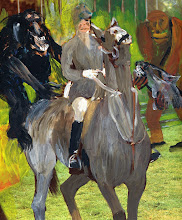3. The Beast: Schürmann - Penseur Maudit
“4. Dialogue
A. Was I ill? Have I recovered?
Has my doctor been discovered?
How have I forgotten all?
B. Now I know you have recovered:
Healthy is he who can’t recall.”☟
A. Was I ill? Have I recovered?
Has my doctor been discovered?
How have I forgotten all?
B. Now I know you have recovered:
Healthy is he who can’t recall.”☟
Drawing on his experience of ‘zazen’ and Meister Eckhart, Schürmann is exceptional as a thinker in that one concept or conceptual persona or topological site – ‘loss of origin’ – seems to encompass what he is and what he thinks. Loss of the origin refers both to his own natality which he denies and abandons – his German birth into a German people in its collapse, – and his anti-metaphysical an-archic onslaught against the First Cause or Principle or the One – for which arche and telos are both ‘without why’. Here he never ceases to follow Meister Eckhart:
“Leaving things, leaving God, living without why: these teaching of Meister Eckhart surely sound subversive. Indeed they are literally a subversion, an overthrow (vertere) from the foundation (sub-). (…) One imagines what happens to the scholastic constructions when unexpectedly a preacher comes along who unveils the nothingness of foundations; the scholastic mind is seized with dizziness. The God whom this other way of thinking annihilates in his function of foundation is perhaps indeed the God of western Christianity.” (Loss of Origin in Soto Zen and Meister Eckhart, The Thomist, 42, 2, April, 1978, p. 309)
One can almost hear the novitiate Schürmann shocking, unnerving his Dominican teachers in Le Saulchoir with similar arguments and dialectic.
One can almost hear the novitiate Schürmann shocking, unnerving his Dominican teachers in Le Saulchoir with similar arguments and dialectic.
Befitting to someone who devoted his life to the “loss of the origin”, Schürmann’s writings abound with faces, masks, symbols and astral bodies. One wonders if they are his esoteric avatars. Is a part of him the Puma shaped Inca city in Le Principe d’Anarchie – symbol and type of a defunct empire without writing based on seemingly eternal non-corroding laws: the principium of arithmetic and the decimal system – an extreme articulation in the ‘new world’ of Horace’s ‘nos numerus sumus et fruge consumere nati’. (we are numbers, born but to consume resources.) Though as with all defunct empires, something remains. The Incas are gone but we still are numbers.
Gérard Granel in Untameable Singularity his tribute to Schürmann in the same In Memoriam Reiner Schürmann issue describes another mask:
Gérard Granel in Untameable Singularity his tribute to Schürmann in the same In Memoriam Reiner Schürmann issue describes another mask:
„The kouros, the young man borne away by the mares, whom the Goddess firmly enjoins to hold the present and the absent together, is Schürmann himself.“ (Graduate Faculty Philosophy Journal, New School for Social Research Vol. 19 No 2-Vol. 20 No. 1, 1997, pp. 224-5)
Schürmann puts himself on stage in many guises and allegorical costumes: In America, for example he lives, “as a stranger, in the midst of the most ideologically brutal of Western people at the century’s end – of a people who equally brutally deny not only singularities but even their own ideological fantasms and maximizations.” (Broken Hegemonies, Indiana University Press, 2003, p. 638)
Or in imitation of Foucault – he constitutes himself an anarchistic transgressive subject.
 |
| Mehdi Belhaj Kacem at the Reiner Schürmann Colloquium, Berlin, Nov 2017 |
In Symbolic Difference and Symbolic Praxis – a pair of alchemical mystical texts – everything is on the verge of turning into its opposite, a permanent cum-vertere/conversion.
“The reversal of existence, brought about by conversion is the return of the existent to its origin (…)” (Symbolic Difference, In Memoriam Reiner Schürmann, ibid. p. 30)
Instead of loss of origin, Schürmann surprisingly proposes its recovery - the symbol of wandering ‘peregrination’ awakens the romantic lure of the homeland: “the mystery is the homeland”, writes Schürmann the escapee. The repertoire of German wandering such as Parsifal, the Grail, the blue flower, Angelus Silesius’ ‘rose without why’, Novalis, Christian eroticism, German romanticism is opposed to the feminine counter symbol of deceitful, unfathomable and threatening water – which can cleanse but mostly bewitches, tempting the wanderer to suicide or as the ally of Loreley blinding him to the rocks so he perishes in it.
Water though is not just feminine – it is also Poseidon – avenger and father of Theseus – annihilator of Hippolytus.
But perhaps Schürmann is Oedipus who has one eye too many – at the entrance to Thebes? Or the Sphinx – or the riddle – or all of these at once? Solving himself he then flings himself from the rock.
His book Broken Hegemonies says Granel is one vast solution to the riddle. Schürmann he implies is not just the Parmenidean kouros, he is Oedipus for the riddle of Europe’s history, its “deadly illness of temporality” (ibid.,p. 216). Schürmann is an ‘Oedipal’ son of a disgraced defeated German father, whose shame and unnamed suspected complicity with the Nazi regime haunts his autobiographical work Les Origines.
For his contemporaries he seems to have the mystique of an Empedocles who plunging into Mount Etna – leaves his bronze sandal behind. Unlike many other thinkers – not just his work – his life – seems to pose a question to which he responds in advance – “without why”. The thought of this life resembles that thinking which disappears back into itself – at the end of Adorno’s Negative Dialektik – the same thinking which ‘fraternizes with metaphysics at the moment of its fall’.
For his contemporaries he seems to have the mystique of an Empedocles who plunging into Mount Etna – leaves his bronze sandal behind. Unlike many other thinkers – not just his work – his life – seems to pose a question to which he responds in advance – “without why”. The thought of this life resembles that thinking which disappears back into itself – at the end of Adorno’s Negative Dialektik – the same thinking which ‘fraternizes with metaphysics at the moment of its fall’.
 |
| Emma Bianchi and the Author at NYU, New York City, April 2017 |
 |
| Francesco Guercio at the Reiner Schürmann Colloquium, Berlin, Nov 2017 |
Schürmann had a tense relationship with the regime he obsessively derides. “The great philosophical bureaucracy” performing the “corporate role of philosophy” is his bête noire – especially in its American manifestation. The breaking of the hegemonic phantasms also deposes the katechontic philosophical ‘caste’ which secures their continuing existence – those who Schürmann describes, quoting Husserl, as “the civil servants of humanity” or “the bureaucratized version of the philosopher-king”. (Broken Hegemonies, ibid. p. 8)
✦ The Unapproachable Reiner Schürmann - A Phantasmatic Philosopher: Film Without Why (Parts 1-3) is an expanded version of our film project presentation and trailer premiere at the Reiner Schürmann Colloquium, Espace diaphanes, Berlin, November 2nd 2017.
☟(from Friedrich Nietzsche, The Gay Science, “Joke, Cunning and Revenge”, Prelude in German Rhymes, Poems translated by Adrian del Caro, Cambridge University Press, 2001, p. 12)
© Shannee Marks and Peer Wolfram, Ulysses Productions, November 2017


































.jpg)













